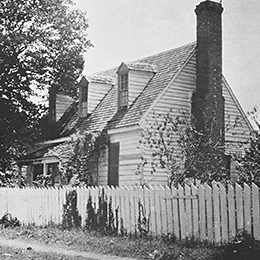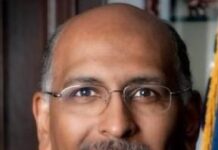 Last fall, the College of William and Mary and Colonial Williamsburg announced that they had verified that a building on the college’s campus, which was built in 1760, was the home of the Bray School where both enslaved and free Black children were educated in the eighteenth century. The college sold the building to the Colonial Williamsburg Foundation.
Last fall, the College of William and Mary and Colonial Williamsburg announced that they had verified that a building on the college’s campus, which was built in 1760, was the home of the Bray School where both enslaved and free Black children were educated in the eighteenth century. The college sold the building to the Colonial Williamsburg Foundation.
The foundation has begun renovations to remove the modern additions to the building. Later this year, the building will be removed from its foundation and transported to a new home five blocks away to become a fixture in Colonial Williamsburg. Funding for the project recently received a boost with a $5 million grant from the Andrew W. Mellon Foundation. Earlier funding included grants from the Truist Charitable Fund and the Gladys and Franklin Clark Foundation.
Upon its arrival, the Williamsburg Bray School will become the 89th original structure on Colonial Williamsburg’s campus — the first new addition to the Foundation’s cadre of historic buildings since the 1960s. The foundation anticipates restoring the structure to its original state by 2024, which marks the 250th anniversary of the school’s closure on the eve of the American Revolution.
In addition, the college has established the William & Mary Bray School Lab that will document the school’s history to fully understand its complex legacy. The William & Mary Bray School Lab is comprised of William & Mary students, faculty, and collaborators whose research is focused on gaining a deeper understanding of the school from the perspectives of families whose children attended it. They also are examining the motivations of the founders who developed the institution and its pro-Christian curriculum in which White slaveowners sent Black children to this school to receive indoctrination in the Christian faith.
 The William & Mary Bray School Lab is being led by Maureen Elgersman Lee. She is the former chair of the department of political science and history at Hampton University in Virginia. “The lab creates an incredible opportunity to continue to welcome the local community into the academic spaces where we have traditionally formed our understanding of history and culture,” Dr. Elgersman Lee said. “As a historian, and as someone who has worked in community history, I’ve learned that the history often resides much more in the community than in the academic spaces. I see building and strengthening these bonds as an essential component of lab work.”
The William & Mary Bray School Lab is being led by Maureen Elgersman Lee. She is the former chair of the department of political science and history at Hampton University in Virginia. “The lab creates an incredible opportunity to continue to welcome the local community into the academic spaces where we have traditionally formed our understanding of history and culture,” Dr. Elgersman Lee said. “As a historian, and as someone who has worked in community history, I’ve learned that the history often resides much more in the community than in the academic spaces. I see building and strengthening these bonds as an essential component of lab work.”
“This nondescript building that was hidden in plain sight for decades is taking The Colonial Williamsburg Foundation and William & Mary in a new and exciting direction,” said Cliff Fleet, president and CEO of Colonial Williamsburg. “This important work will expand our understanding of 18th-century America and add to our body of knowledge about this important time in our nation’s history. These new stories will be passed along through our public history programming and offer visitors a richer and deeper connection to our shared past.”










